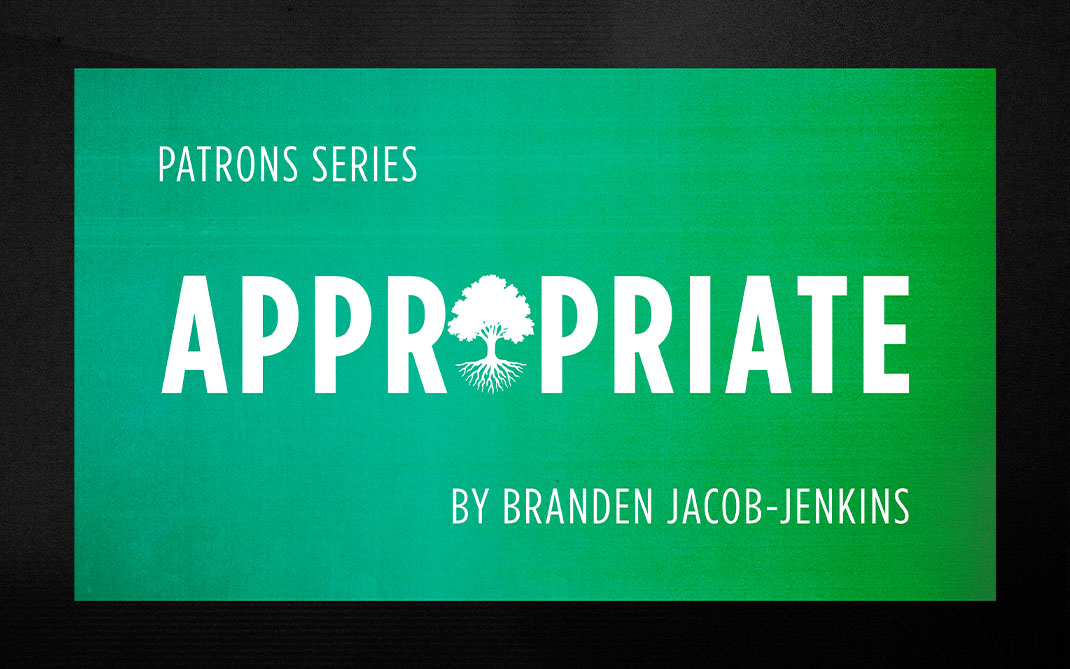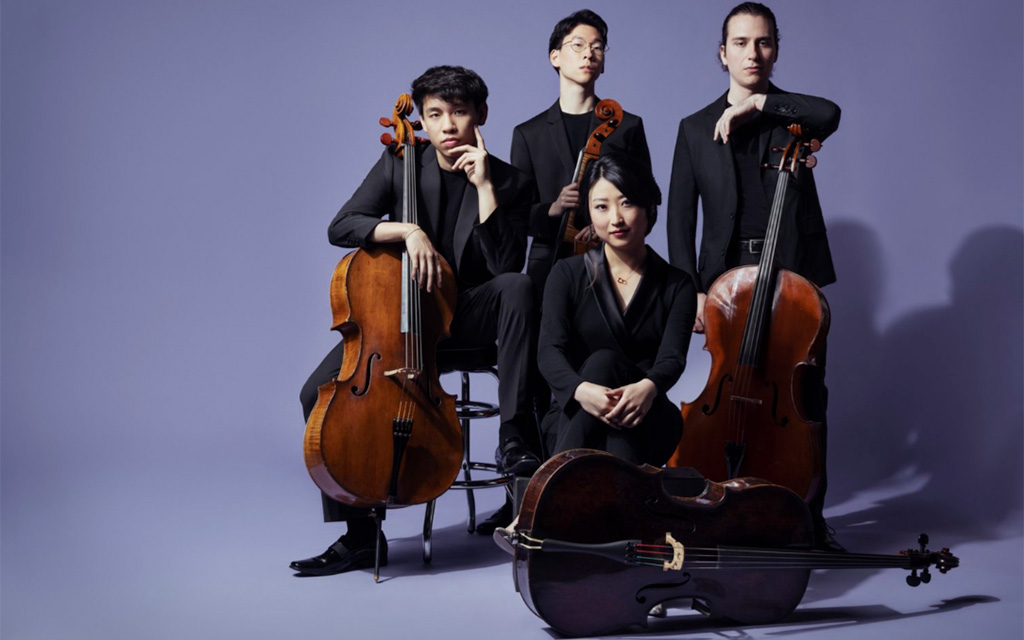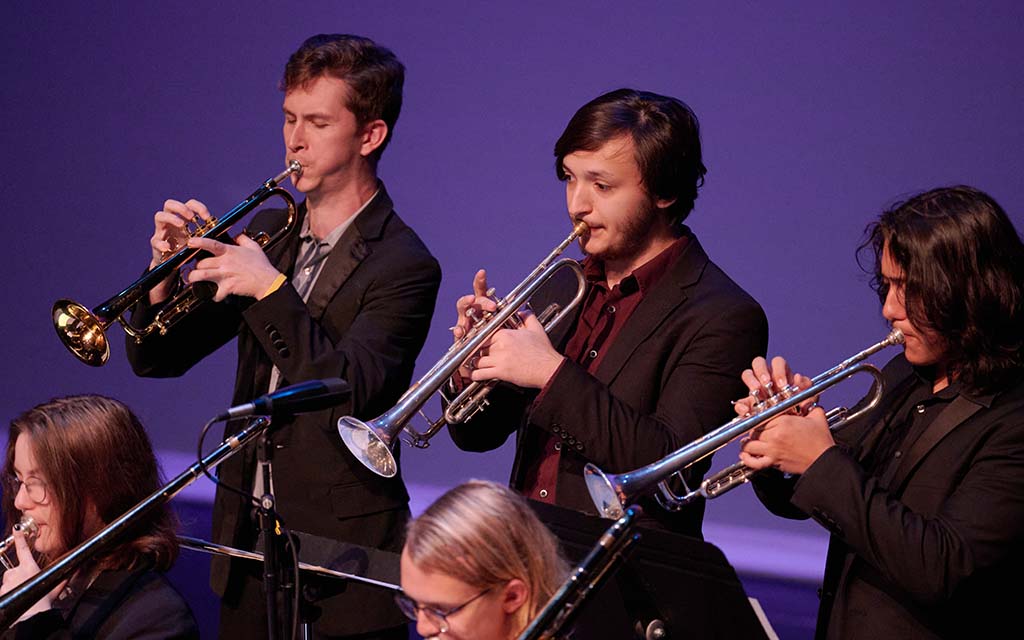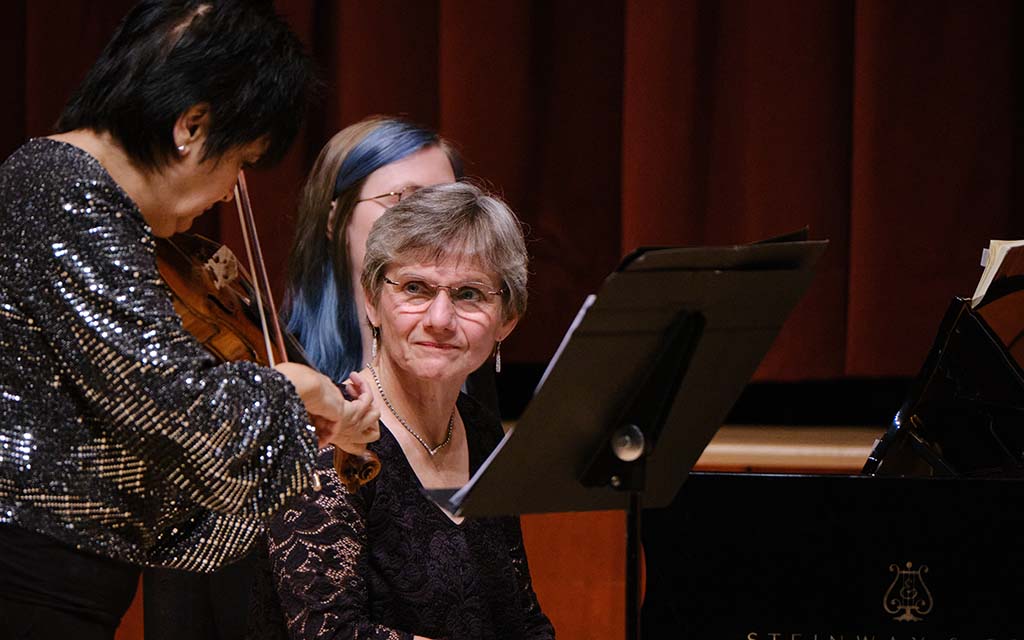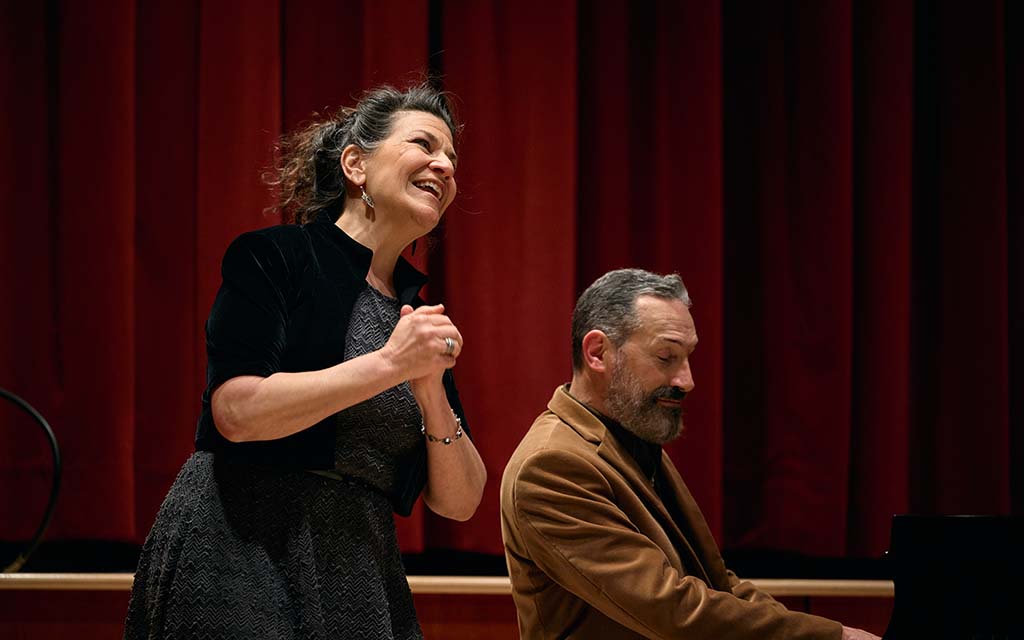Chapter V: High School Residential and Community Policies, Infractions and Procedures
In addition to the Student Code of Conduct and Housing policies, all students enrolled at UNCSA must follow the UNCSA Residential and Community Policies. UNCSA encourages character formation and development by asking all students, as members of the University community, to uphold the highest standards of personal behavior and responsibility in all settings.
A. Community Considerations:
Community policies assist students living in close proximity to other student artists.
While most of the policies apply primarily to public areas (hallways, lounges, stairwells,
kitchens, etc.), students should realize that areas of personal space are interdependent
and interwoven. Thus, these rules also apply to individual rooms. All students should remember that they are responsible for what occurs in their rooms
and for items placed in their rooms.
B. Common Areas:
It is expected that students will respect all campus facilities and clean up after
themselves. If common areas are found to be in unacceptable conditions, a Residence
Life team member may temporarily close the facility. Furnishings and equipment in
common areas may not be moved from those areas. Students identified as responsible
for any damages in the residential facilities will be held charged accordingly. Students
will lose residential privileges if spaces are left unclean.
C. Illness and Medical Confinement:
Residential students who are too ill to attend class must report to the Wellness Center
before class begins. If a student is too ill to walk to the Wellness Center, then
that student should immediately notify a High School Life staff member or Campus Police.
High School staff can be reached by calling the High School Primary phone. A visit
to the Wellness Center does not automatically excuse a student from class. Also, parents
or guardians of residential students may not call or write to excuse a student from
classes because of illness unless their son or daughter is at home with them at the
time the illness occurs (e.g., during a weekend visit home).
When a UNCSA high school student requires urgent care in a hospital emergency department or the Vice Provost and Dean of Student Affairs (or his/her designee) determines that the comfort and consultation of a parent/guardian is in the best interest of the student, it is the policy of the Division of Student Affairs that the parent/guardian of any high school student under these circumstances be notified immediately. Furthermore, it is the expectation of UNCSA, that the parent/guardian make immediate arrangements to come to campus or the hospital emergency department to connect with their student and that this be done as soon as possible (i.e. 120 miles: 2 hours; 360: 6 hours, etc.)
D. Curfew and Quiet Hours:
The curfews below apply to all high school students. All High School students are
expected to follow the curfew expectations. A student may request a curfew extension
for academic or art obligations but permission must come from faculty and be approved
by Residence Life staff ahead of time. Faculty members can provide Residence Life
staff with names/dates/times of curfew extension requests. Students must remain with
their art/academic faculty/staff member during the curfew extension.
|
Weekday (Sundays-Thursdays) |
Weekend (Fridays-Saturdays) | |||
|---|---|---|---|---|
| Grade |
In Building Curfew |
In Room Curfew |
In Building Curfew | In Room Curfew |
| 9th | 10 p.m. | 11 p.m. | 11 p.m. | 11:30 p.m. |
| 10th | 10 p.m. | 11 p.m. | 11 p.m. | 11:30 p.m. |
| 11th | 10 p.m. | 11 p.m. | 11 p.m. | 11:30 p.m. |
| 12th | 10 p.m. | 11 p.m. | 11 p.m. | 11:30 p.m. |
In-Building Curfew: Students are required to be inside the High School Connector building as listed in the chart above.
In-Room Curfew: Students are required to be in their assigned room at the listed times in the chart above. Curfew checks will take place during this time. Curfew checks consist of professional staff checking every room to ensure the student’s presence. Students (and approved overnight guests) must remain inside their room until the staff member turns off the hallway light to indicate the completion of curfew checks. Students are then able to leave their room but must remain on their floor. During the week, students are asked to remain in their assigned rooms from midnight until 5 a.m. the next morning. There shall be no door propping or moving between rooms after midnight.
Quiet Hours and Courtesy Hours: During quiet hours (weekdays 10 p.m.-10 a.m.; weekends 11 p.m.-11 a.m.), no noise may reach beyond the individual rooms. Also, the high school community has a 24-hour courtesy policy. Residents should not create unreasonable, excessively loud, irritating, or disturbing noise in the residence halls at any time. Arts practice (for instance, playing of music, vocalizing, dancing, or juggling) is allowed in the residence halls from noon-8 p.m. every day, but should be kept at levels that will not interfere with study or sleep. Common areas should not be used for music practice, unless a student uses the Gallery piano.
E. Room Inspections:
The Residence Life Staff conducts a visual inspection of each room on a consistent
basis, students will be notified 24 hours before inspections are conducted. Should
a student fail inspection, the student will be given 24 hours to correct all unsatisfactory
conditions.
Note: Violations to the Housing Contract and Policies will be reported to the Housing Office. Violations to the Student Code of Conduct will be reported to Student Conduct.
F. Sign-Out Policy:
All residential High School students are required to request a pass and receive approval from a High School Life staff member via the student pass system every time they leave campus. This includes official school trips. For early morning departures (before 8 a.m. on school days or before noon on Saturdays and Sundays), students must sign out the night before by reporting to the Connector Desk and receiving approval. Students will remain in the custody of the supervising adult until the student signs back in at the Connector Desk.
If at any time a member of the High School Life staff has concerns about the validity of the permission or feels that the place where the student is going is inappropriate, they can override the permission. The legal parent or guardian will be notified via the student pass system that a pass is not approved and the reason why.
Students must request a pass, receive appropriate permission from their parents/guardian, and receive approval from High School Life staff to leave campus. Sign outs occur at the Connector Desk and students must go to the desk to receive final approval.
Students who change destination, companion/drivers, mode of travel, or time/day of return are responsible for telephoning the Connector Desk and reporting this change.
Students may sign out to walk or bike off campus if it is before sunset and if the weather permits it. Students walking off campus must do so as a group of two or more.
Special Procedures and Considerations for Certain Types of Sign-Outs
Overnight Sign-Outs
- If someone other than the student’s legal parent/guardian will be transporting the student for an overnight trip a pass request must be submitted via the student pass system and parents must approve the request at least 48 hours before departure.
- Students must sign out for overnight trips before in-building curfew.
- Students must sign back in after an overnight stay once they return to campus.
- All drivers picking up a student, including the student’s legal parent/guardian must display a valid driver's license/legal picture ID to sign out the student.
- All high school students must be staying at a residence in which an adult will be present during the entire visit.
- No student is allowed to spend the night in the UNCSA college residence halls or Center Stage apartments.
Sign-Outs to Visit Off-Campus Residences (Not Overnight)
- No student is allowed to visit an off-campus residence until they have received permission from their parent/guardian. If permission is granted, students may only visit during the day.
- An adult must be present when the UNCSA high school student visits the residence.
G. Sidewalk Chalk and Spray Paint:
During the course of the year, there may be times when students want to use sidewalk
chalk for their artwork or to promote an activity. Sidewalk chalk must only be used
on sidewalks or permitted chalk boards on campus. As well, in order not to damage
the facilities, spray paint should only be used on the grass. This will keep the paint
from permanently defacing the sidewalks, stairwells and other structures.
H. Vehicles:
Residential high school students cannot drive nor have access to any vehicle during
the academic school year, unless signed-out and under supervision of parent/guardian.
Violation of this policy may result in a Major infraction at the discretion for the
Director for Student Conduct.
I. Guests for Residential Students:
Visitors and guests of UNCSA community members must obey UNCSA policies and regulations.
The host student is responsible for the visitor’s behavior and may be found responsible
if the visitor breaks UNCSA policies. Parents and guardians may be on the halls after
checking in at the Connector desk but must leave by curfew before the building is
alarmed. All other visitors or relatives must receive special permission from the
High School Life staff to visit the halls. For the protection of the students, UNCSA
reserves the right to check any visitor’s ID.
J. Overnight Visitors:
Students may have same-sex guests spend the night in their rooms on Friday and Saturday
nights. These guests must be between the ages of 13 and 19 and may not be college
students. The student requesting a guest must fill out a guest form, found at the
Connector Desk, 24 hours in advance.
- Residential high school students who wish to have a non-UNCSA guest or a UNCSA commuter student stay overnight must receive permission from the High School Life Staff 24 hours in advance. When the guest arrives, she/he must check in at the Connector Building front desk.
- Students are limited to one overnight guest, who must be signed in by curfew. There can be no more than two guests per room, per night.
- Overnight guests cannot stay longer than 54 hours (Friday noon until Sunday evening).
- Overnight guests must remain with their host at all times.
- The parent/guardian of the guest will be contacted by a High School Life team member for permission.
- If a UNCSA student wants to spend the night in another UNCSA student’s room they must receive staff permission at the Connector desk prior to the start of curfew.
K. Intervisitation:
Students of the opposite sex are not allowed to visit each other’s residence halls.
On occasion, special time periods may be designated to allow students the privilege
to participate in an intervisitation event when students of the opposite sex are allowed
to visit each other’s residence halls during specific supervised times. If an intervisitation
time is announced, students would be expected to comply with all guidelines outlined
for participation in an intervisitation. Expectations will be clearly outlined and
posted at the Connector Desk. All participating students must sign-in at the Connector
Desk. Periodic rounds will be conduct by staff during intervisitation.
L. Residence Hall Closing Periods:
Any student who has not vacated the halls within 24 hours of their last exam or by
the designated closing date and time, whichever comes first, will have $25 billed
to their account for a late check-out. An additional $25 will be billed for every
hour that the student remains in the building.
For details on Residence Hall opening and closing times related to breaks and the end of school, please refer to the Registrar's academic calendar.
Note: At the end of the school year, underclassmen must leave campus within 24 hours of their last exam. No underclassmen should remain on campus after 6 p.m. on the last official day of Spring semester.
M. Sunbathing (High School Only):
Sunbathing is allowed only on the hill area north of the Hanes Student Commons and
in the yard behind the High School residence halls.
N. Storage for Scooters/Bikes:
All non-motorized scooters, skateboards, longboards, and other forms of transportation
are to be stored in the student’s assigned room. Bikes can be stored in the bike rack
outside the Connector building or in the student’s assigned room away from any emergency
exit.
Powered scooters, hoverboards, electronic skateboards, e-bikes, and other personal transportation or micromobility devices that use gasoline, electricity, or batteries (including but not limited to lithium-ion batteries) are prohibited from being used, possessed, stored, or charged in any UNCSA residence hall or apartment. These devices pose a significant fire hazard due to the batteries and fuels used in their operation.
Accordingly, such devices may not be stored in student rooms, apartments, or suites, nor may they be charged anywhere inside campus residential facilities.
Note: Devices used for ADA mobility needs are exempt from this policy.
O. Residential and Community Policies Infraction Notification Procedures:
The Residential and Community Policies infractions, outcomes, and notification procedures
at UNCSA are designed in a manner that prioritizes student development and education.
The emphasis upon student education and growth as the primary objectives of the Residential
and Community Policies Agreement distinguishes this community-based procedure from
the UNCSA Student Conduct process.
Note: Depending on the severity of the infraction, the student may be charged with a minor or major infraction through the UNCSA Student Conduct Process. If this happens, please refer to the UNCSA Student Code of Conduct.
High School Residential and Community Standard Infractions
-
Failing to comply with sign-out procedures, including failing to sign out, signing out without permission, or being in any place other than that stated on student pass system.
-
Failing to return by time/date indicated on the student pass system without informing High School Life.
-
Passing or receiving anything through a residence hall window.
-
Failing to comply with curfew policies
-
Failing to comply with curfew check
-
Failure to attend community meeting
-
Being in a college residential area or other restricted area.
- Being present on the opposite sexed floor without permission from Residence Life staff.
- Failing to leave campus within 24 hours of their last examination. No underclassmen should remain on campus after 6 p.m. on the last official day of spring semester.
- Walking or biking off campus after sunset.
- Leaving floor after in-room curfew without receiving approval from a Residence Life staff member.
- Failing to remain in attendance at performances that run past curfew, unless to return directly to the residence hall.
- Failing to comply with the High School Medication Policy, including but not limited to, failing to register all prescription medication with Health Services.
- Being in another person’s room without permission from the resident, or absent the resident, permission from Residence Life staff.
- Intentionally furnishing false information to a member of the faculty, staff, or a student acting in an official capacity either verbally or in writing, including falsification by omission of information.
- Failing to comply with orders or directives of school officials, UNCSA Campus Police, or any other law enforcement officers (may constitute a minor or major infraction at the discretion of the Director for Student Conduct).
- Violating the guest policy
- Hosting a guest/visitor who violates UNCSA’s Student Code of Conduct or the Residential and Community Policies Agreement.
- Violating the Car Policy.
- Violating the UNCSA computer policy, including distribution of mass emails to the campus.
- Possessing a personal item that has been deemed a nuisance or safety hazard, about which a prior warning has already been issued.
- Unauthorized use of another person’s One Card.
- Being locked out of residence hall room three or more times.
- Being present during the planning or commission of any Residential or Community Standard Infraction in such a way as to condone, support, or encourage that infraction.
- Failing to comply with an active Residential and Community Standard outcome.
- Failing to comply with quiet or courtesy hours.
- Failing to notify and receive approval from Residence Life to spend the night in another student’s room.
- Inappropriate display of affection.
- Failing to clean up common spaces after use.
- Failing to comply with intervisitation expectations.
- Ordering food less than one hour before curfew time.
- Referral from Student Conduct for being in the presence of an infraction of the student code of conduct
- Referral from Student Conduct for committing an infraction of the student code of conduct
- Unapproved sale or advertisement of any product, membership, or service on campus.
Notification Procedure of a Residential and Community Policy Infraction
The Residence Life staff will issue the Residential and Community Policy Infraction
at the time of, or as soon as possible after, the infraction. If any UNCSA faculty
or staff observes a possible Residential and Community Policies Infraction, they should
email an incident report listing factual information to the Assistant Director of
High School Life.
Note: Depending on the severity of the Residential and Community Policies Infraction, the student may be charged through the UNCSA Student Conduct Process. If this happens, please refer to the Student Code of Conduct.
- A student who receives a Residential and Community Standard Infraction must schedule a meeting with a High School Residence Hall Coordinator within 24 hours of receiving the infraction. The meeting should take place as soon as possible. During the meeting, the High School Residence Hall Coordinator will have an educational conversation with the student and assign an appropriate outcome. Finally, the student’s parent(s) or legal guardian(s) may be notified.
- The Residential and Community Policy Infractions will be filed in the student’s High School Community file. The High School Residence Hall Coordinator will monitor the completion of any outcomes.
- The student who receives the infraction may want to also discuss their infraction with the Assistant Director of High School Life. This request must be in writing and signed by the student (specifying why they would like to meet) and given to the Assistant Director of High School Life.
Possible Outcomes for Residential and Community Standard Infractions
Residential and Community Standard Infractions remain on a student’s community record
for the entire academic year. Three infractions within the same academic year become
an automatic minor infraction as listed in the Student Code of Conduct. Possible outcomes
for Residential and Community Standard infractions include, but are not limited to:
- Early in-building or in-room curfew
- Loss of privileges
- Work detail
- Restitution of damages
- Educational task: Activity related to the student’s actions, designed to increase
the student’s understanding of, or appreciation for, the Level-1 or Level-2 Infraction
which they committed. Examples of educational tasks are:
- Completing campus or community service
- Making written or verbal apologies
- Completing reflection assignments, such as:
- Reading a related article and writing a paper on the topic
- Speaking with local police (or other resources) and then writing a reflection assignment
- Watching a video and writing a paper (e.g., “How Fast It Burned”)
- Creating a survey for floor or hall, determining the effect of noise on the floor/hall community, and writing a report of the results
- Making presentations at floor/area meetings
- Creating bulletin boards
- Preparing fliers, posters, top 10 lists (e.g., top 10 things to use instead of candles)
- Making a 5-minute video that outlines the policy in question and makes it clear to the residents in an entertaining manner
- Coordinating an “alcohol alternative” program, such as a dance
- Working at the SPCA for pet violations
- Entering into a behavioral contract
- Volunteering at community agencies
- Mediation
- Case conference
- Campus service hours such as:
- Taking out the trash in the morning
- Cleaning the residence hall, Connector common areas, or state vehicles
- Cleaning the residence hall bathrooms
- Sweeping the steps and sidewalks
- Picking up trash outside
- Cleaning signs around campus
- Cleaning up in the Dining Hall or Pickle Jar
- Making ice bags
- Planning appropriate programming
- Working at a high school or campus-wide event
Campus service hours will be supervised and may occur early in the morning, before classes, and on the weekends.
